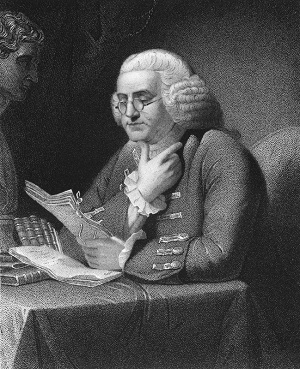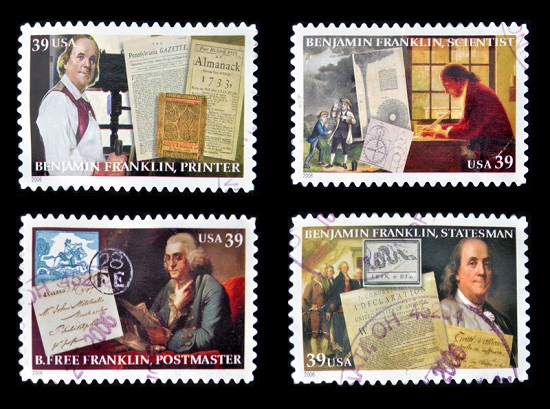

 Benjamin Franklin was a popular American printer, born on 6th January 1706 in Boston. He was a well-known scientist and author. He had a great contribution to editing the ‘Declaration of Independence’. Franklin participated in the writing of the Declaration of Independence and was one of its signatories. He also served as a representative of the United States to the Constitutional Convention in France. He is remembered for making significant advances in science, particularly in the science of electricity.
Benjamin Franklin was a popular American printer, born on 6th January 1706 in Boston. He was a well-known scientist and author. He had a great contribution to editing the ‘Declaration of Independence’. Franklin participated in the writing of the Declaration of Independence and was one of its signatories. He also served as a representative of the United States to the Constitutional Convention in France. He is remembered for making significant advances in science, particularly in the science of electricity.
Franklin was born from a man who produced soaps and candles. His father worked as an artisan craft. Franklin remarked in his Autobiography, “the youngest Son of the youngest Son for five Generations back” in a period when the eldest son of the family was valued.
When he was only 10, his official schooling came to an end. He had learnt to read quite early and attended school for learning grammar for one year. At 12, he became a trainee under his brother James, who was a printer. He became an expert in the printer's art during his training from 1718 to 1723.
He was enthusiastic about writing poems, but when he realised that his poems are poor in quality, he lost interest. A spectator which contained the writings of Sir Richard Steel and Joseph Addison was published in England in the year 1711-1712. He wrote about “prose writing” in his autobiography, “of great Use to me in the Course of my Life, and was a principal Means of my Advancement.”
James Franklin established a newspaper, named the New England Courant in the year 1721. Readers contributed a lot to this. He published a collection of 14 pieces, named “Silence Dogood” in 1722. Franklin had “exquisite Pleasure” in the idea that his brother as well as other people came to think that all these articles must have been authored by an intelligent and sophisticated wit. It was an impressive attempt for someone so young to acquire the role of a middle-aged woman.
Before the end of 1722, James Franklin had issues with the authorities, and he was forbidden from publishing the Courant. He released his younger brother from the initial internship and appointed him the publisher of his paper to continue the publication of the paper. A few months later, Benjamin quietly left the house because he was confident that James would not expose him.
Franklin moved to Philadelphia at the age of 17, a city, where he failed to find a job in New York City. Franklin, who was neither wealthy nor educated, built a platform in Philadelphia and achieved success. He started to gather books and founded institutions like the American Philosophical Society and the Library Company of Philadelphia. He launched the Pennsylvania Gazette in 1729. Franklin established the first fire department of volunteers and was appointed Philadelphia's postmaster in the 1730s.
He was selected to serve on Philadelphia's town council on October 4, 1748. He nominated a justice of the bench the following year. Furthermore, he was chosen to participate in the assembly of Pennsylvania in May 1751. Since 1736, he had served as a clerk of the assembly.
He immediately gained authority and influence as a result. He was selected to work as North America's deputy postmaster on August 10, 1753. Franklin submitted an essay appealing for union on May 4, 1754. The political cartoon, in the essay, was possibly published in an American newspaper for the first time and became a significant American logo. During the American Revolutionary War with France, he commanded 500 soldiers to the border in 1756 and constructed a fort. Then Franklin went to England. Franklin discovered that nearly no one comprehended a lot about American life when he visited with the emperor's minister to plead Pennsylvania's case. Then he became tired of politics and left that.
He created a variety of inventions, such as swimming paddles and the Franklin stove or the Pennsylvania Fireplace. He also invented the lightning rod to minimize the frequency of lightning-related fires. Franklin constructed an odometer that would have been connected to a vehicle. He had a great contribution to the invention of the swapping device of specs.

Midway through the 1720s, Benjamin Franklin made his first trip to London as a young printer and lived there for 18 months. From 1757-1762, he again visited England to represent the assembly of Pennsylvania. He also travelled to Craven Street of London in the year 1764-1766. Franklin went to France in the year 1776 – 1778 with the crucial duty of gaining the French government's support towards the independence of America.
On the date of April 17, 1790, Benjamin Franklin passed away. The age of Franklin was 84 at that time. He had experienced pleurisy attacks in the past, which led to empyema. That was the reason behind his death.
Benjamin Franklin, who was a printer at an early age, came out with a spark in the field of literature and science. Besides writing many poems and essays, he invented many useful things like an odometer, stove, lightning rod etc. He was one of the famous politicians as he represented the assembly of Pennsylvania many times to the whole of Europe. For such great contributions to the field of science, literature, and politics, Benjamin Franklin will be remembered always.
Q1. What was the reason for the battle that Benjamin fought for?
Ans. Benjamin Franklin (1706–1790), holds a prestigious place in American history. Benjamin Franklin (1706–1790), holds a prestigious place in American history. He made a crucial contribution to both the Revolutionary War and the fight for American independence. He has also contributed significantly to the formulation of the United States Constitution and the nation's objectives.
Q2. What was Benjamin Franklin influenced by?
Ans. Franklin undoubtedly gained interest from the religious faith of Philadelphia's Quakers and Boston's Puritans. Their strong emphasis on the importance of the protestant work influenced him.
Q3. Did Benjamin Franklin make an effort to abolish slavery?
Ans. His final public display was to submit an appeal to Congress and requested the abolishment of slavery. In 1789, he authored and published numerous essays in support of the end of slavery.